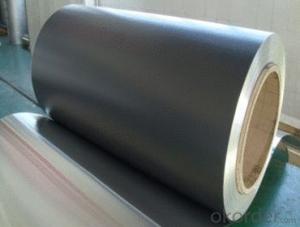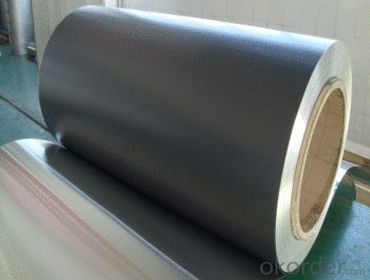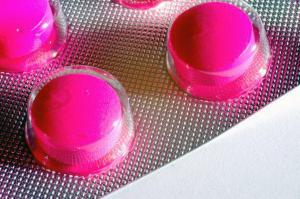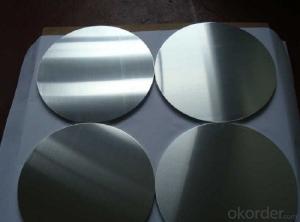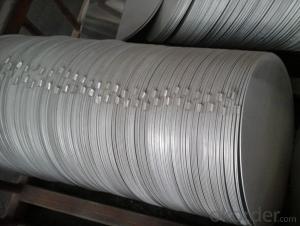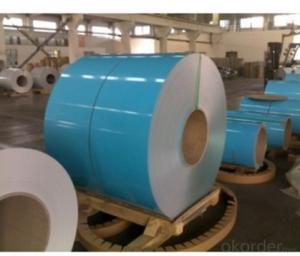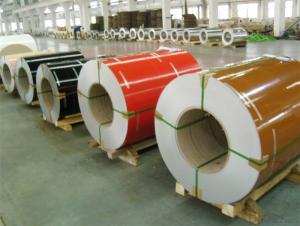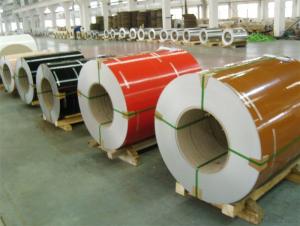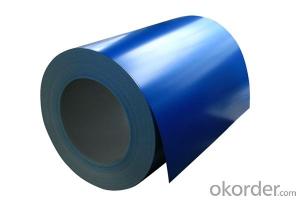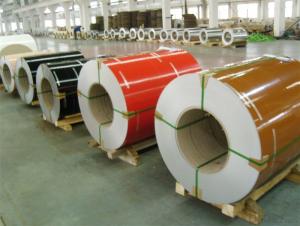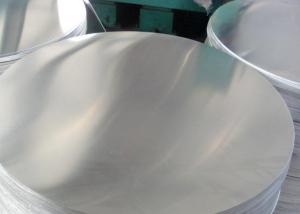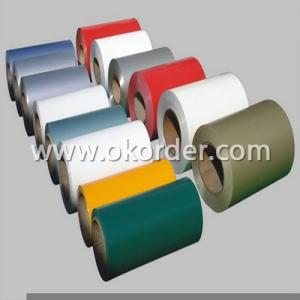Aluminum Prepainted Coil with PVDF - Best Quality
- Loading Port:
- Shanghai
- Payment Terms:
- TT OR LC
- Min Order Qty:
- 8 m.t.
- Supply Capability:
- 2000 m.t./month
OKorder Service Pledge
OKorder Financial Service
You Might Also Like
Structure of Aluminium Coated Coil Description:
Coated aluminum coil/sheet are of a wide range of colors, which gives wonderful appearance no matter in residential and commercial constructions of great exhibition centers.
Interior: wall cladding, ceilings, bathrooms, kitchens and balconies, shutters, doors...
Exterior: wall cladding, facades, roofing, canopies, tunnels,column covers , renovations...
Advertisement: display platforms, signboards, fascia, shop fronts...
Main Features of the Aluminium Coated Coil:
Enviromental, light weight, waterproof, fireproof, anti-rust, weather resistance, easy cleaning, easy matching with other decoration materials...
Images of Aluminium Coated Coil:
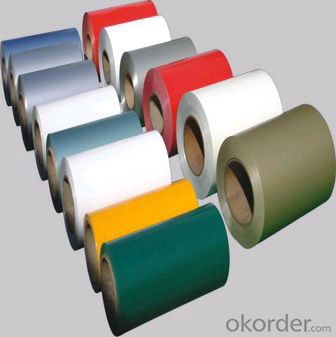
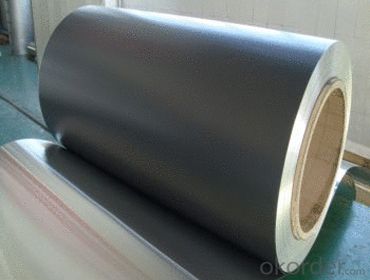
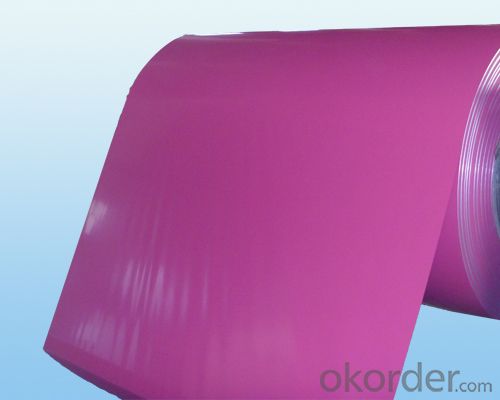
Aluminium Coated Specifications:
Grade | 1050,1060,1070, 1100, 1200, 2024,3003, 3004,3005, 3105, 5005,5052 5182,5754,8011 etc. |
Thickness | 0.1~1.6mm |
Width | 21~1600mm |
Application | Decorative Materials |
Surface Treatment | Coated |
Temper | O - H112 |
Hardness | More than 2H |
Yield (≥ MPa) | 160 |
Temper | O - H112 |
Ultimate Strength (≥ MPa) | 175 |
Elongation (≥ %) | 6 |
Packing material | Moisture-proof agent, steel tape bundle, wooden pallet, brown paper |
Method | Vertical( eye to sky) or horizontal( eye to wall) |
Standard spec | 1000mm xC, 1200mm xC etc |
Shipping | Container Loading or Bulk Pack |
FAQ of Aluminium Coated Coil:
a.What is monthly capacity
---CNBM is one stated own company and our monthly capacity is about 2000tons.
b. Now which countries do you export your goods?
---Now we export to South East Asia,Africa, North America,South America ect.
- Q: Is it possible to recycle aluminum using renewable energy sources such as solar or wind power?
- <p>Yes, aluminum can be recycled using solar energy or wind energy. The recycling process involves melting the aluminum, which can be powered by electricity generated from renewable sources. Solar panels and wind turbines can produce the electricity needed for this process, reducing the carbon footprint associated with aluminum recycling. In fact, recycling aluminum requires only 5% of the energy needed to produce new aluminum from raw materials, making it an energy-efficient process that benefits significantly from renewable energy sources.</p>
- Q: This question asks for various methods that can be used to recycle aluminum.
- <p>Recycling aluminum can be done through several methods, including mechanical recycling, which involves melting and reprocessing aluminum without altering its chemical properties. This is the most common method due to its efficiency and cost-effectiveness. Another method is chemical recycling, where aluminum is treated with chemicals to break it down into its constituent elements, which can then be repurposed. Additionally, aluminum can be recycled through a process called hydrometallurgical recycling, which uses aqueous solutions to extract aluminum from waste. Finally, sorting and collection play a crucial role in ensuring that aluminum waste is directed to appropriate recycling facilities where these methods can be applied.</p>
- Q: Is it possible to utilize aluminum in the manufacturing of components for aerospace applications?
- <p>Yes, aluminum is widely used in the aerospace industry for making various components due to its high strength-to-weight ratio, corrosion resistance, and ease of fabrication. It is commonly used in aircraft structures, wings, fuselage, and engines. Aluminum alloys are preferred for their excellent fatigue resistance and ability to withstand high temperatures and stresses encountered in flight.</p>
- Q: What is the chemical formula that represents aluminum?
- <p>The chemical formula for aluminum is Al. It is a lightweight, silvery-white metal that is found in the Earth's crust and is the most abundant metal there. Aluminum is a member of the boron group of chemical elements and is represented by the symbol Al, which is derived from the Latin word 'alumen', meaning alum.</p>
- Q: The question seeks to understand the steps involved in producing aluminum, from raw material extraction to the final product.
- <p>The process of aluminum production involves several key steps. Initially, bauxite, the primary aluminum ore, is mined. This ore is then crushed and washed to remove impurities. The next phase is the Bayer Process, where bauxite is dissolved in a caustic soda solution under high temperature and pressure, resulting in a solution rich in aluminum hydroxide. This solution is then seeded with aluminum hydroxide crystals, causing more crystals to form, which are then harvested. The final step is the Hall-H茅roult Process, where the aluminum oxide is dissolved in a molten cryolite bath and electrolyzed to extract pure aluminum. This process involves passing an electric current through the bath, causing aluminum ions to be reduced at the cathode, forming molten aluminum which is then tapped off for further processing or use.</p>
- Q: Is aluminum a suitable material for constructing aerospace structures?
- <p>Yes, aluminum is widely used in aerospace structures due to its high strength-to-weight ratio, corrosion resistance, and ease of fabrication. It is particularly favored for aircraft frames, wings, and fuselage components. Aluminum alloys are also used in spacecraft and satellite structures for their lightweight properties and ability to withstand extreme temperatures.</p>
- Q: This question asks about the potential health hazards associated with exposure to aluminum in a work environment.
- <p>Working with aluminum can pose certain health risks, primarily due to inhalation of aluminum dust or fumes. Chronic exposure may lead to respiratory issues such as aluminum lung disease, characterized by shortness of breath and cough. Additionally, aluminum has been linked to neurological disorders, including cognitive dysfunction and memory loss. There's also evidence suggesting a potential connection to Alzheimer's disease, though this is not conclusively proven. Skin contact with aluminum can cause irritation or allergic reactions in some individuals. It's important for workers to use proper protective equipment and follow safety guidelines to minimize these risks.</p>
- Q: Explain the different methods used for recycling aluminum.
- <p>Aluminum recycling methods primarily include mechanical recycling and re-melting. Mechanical recycling involves cleaning, shredding, and sorting aluminum waste before reprocessing it into new products. Re-melting involves melting aluminum scrap and then casting it into new aluminum products. This process is energy-efficient, as it requires only 5% of the energy needed to produce aluminum from raw materials. Additionally, aluminum can be recycled indefinitely without losing its properties, making it one of the most recyclable materials.</p>
- Q: Is aluminum a suitable material for use in electronic components or devices?
- <p>Yes, aluminum is used in electronics, primarily for its excellent thermal conductivity and electrical conductivity. It is commonly used in heat sinks to dissipate heat from electronic components, such as CPUs and power transistors. Additionally, aluminum is utilized in capacitors and as a conductor in wiring due to its low electrical resistance. However, it is not used as widely as copper for electrical conductivity applications due to copper's superior properties.</p>
- Q: Describe the steps involved in the production of aluminum sheets.
- <p>The production process of aluminum sheets involves several key steps. Initially, raw materials, primarily bauxite, are mined and then refined to produce aluminum oxide. This aluminum oxide is then reduced to aluminum metal through the Hall-H茅roult process, where it is dissolved in molten cryolite and electrolyzed. Once the aluminum is produced, it is heated and cast into large ingots. These ingots are then hot or cold rolled into sheets, which are progressively reduced in thickness. The sheets may undergo further processing such as annealing to improve ductility or coating for specific applications. Quality control checks are performed throughout the process to ensure the sheets meet the required specifications. The final product is then cut to size and packaged for distribution to various industries.</p>
Send your message to us
Aluminum Prepainted Coil with PVDF - Best Quality
- Loading Port:
- Shanghai
- Payment Terms:
- TT OR LC
- Min Order Qty:
- 8 m.t.
- Supply Capability:
- 2000 m.t./month
OKorder Service Pledge
OKorder Financial Service
Similar products
Hot products
Hot Searches
Related keywords
